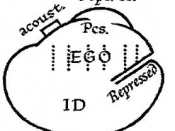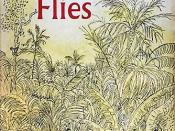"The Lord of the Flies" by William Golding tells the classic tale of plane wrecked English school boys decent to savagery on a desert island. Purposely stranded on an island the story shows how, when isolated, the weaknesses of human nature will emerge. Throughout the story three characters represent each side of Freud's theory of the human psyche; the id, the ego and superego. Jack represents the id, Ralph represents the ego and Simon represents the superego. In "Lord of the Flies" every person's state of mind is represented through a character in some way.
Jack represents the instinctual needs and desires of man, in other words the id. The id is single-minded, motivated by primitive drives to seek pleasure and avoid pain with no perception of reality. Two major instincts dominate the id's mind; Eros or the pleasure seeking drive and Thanatos the death instinct that motivates people's aggressive and destructive tendencies.
The id can first be seen in Jack when he starts taking his hunters off fire duty to hunt. This symbolizes that Jack has started to lose touch with reality. His id can be seen again when Jack first puts on face paint. "He capered toward Bill and the mask was a thing on its own. Behind which Jack hid, liberated from shame and self-consciousness."(58). This shows that with the mask, one will not have to suffer consequences for his actions meaning he has lost his perception of reality. Subconsciously Jack uses this and ignores society's rules. In chapter four Jack kills his first pig, bringing out the Eros and Thanatos in him. "His mind was crowded with memories; memories of the knowledge that had come to them when they closed in on the struggling pig, knowledge that they had outwitted a living thing, imposed...


